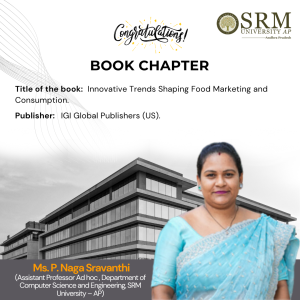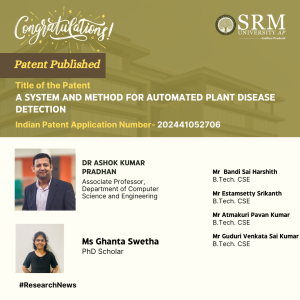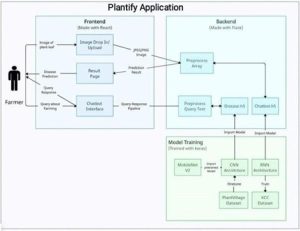Recent News
- Naga Sravanthi Explores the Role of Blockchain in Food Marketing August 23, 2024
 In a significant contribution to the field of food marketing and consumption, Ms P Naga Sravanthi, an Assistant Professor Ad hoc in the Department of Computer Science and Engineering, has recently published a book chapter titled “Blockchain-Based Food Influencer Verification.” The chapter is part of the book “Innovative Trends Shaping Food Marketing and Consumption,” shedding light on the emerging use of blockchain technology in authenticating food influencers.
In a significant contribution to the field of food marketing and consumption, Ms P Naga Sravanthi, an Assistant Professor Ad hoc in the Department of Computer Science and Engineering, has recently published a book chapter titled “Blockchain-Based Food Influencer Verification.” The chapter is part of the book “Innovative Trends Shaping Food Marketing and Consumption,” shedding light on the emerging use of blockchain technology in authenticating food influencers.In the rapidly evolving world of food marketing, trust and authenticity have become more critical than ever. The book chapter delves into how blockchain technology can revolutionise the way food influencers are verified and trusted by their audiences. Blockchain technology, known for its transparency and security features, has been making waves across various industries, and its application in the food sector is no exception.
Ms Naga Sravanthi’s work focuses on utilising blockchain to verify the credibility and authenticity of food influencers, a vital aspect in today’s digital era, where influencer marketing plays a significant role in consumer decision-making. The book chapter explores how blockchain can address issues of trust and reliability in food marketing by providing a secure and immutable record of influencers’ endorsements and partnerships. This innovative approach not only benefits consumers by ensuring they receive genuine recommendations but also helps food brands collaborate with legitimate and reputable influencers.
The publication of this book chapter underscores SRM University-AP’s commitment to fostering cutting-edge research and innovation in diverse fields, positioning its faculty members as thought leaders in their respective domains. Ms Naga Sravanthi’s work serves as a testament to the university’s dedication to academic excellence and pushing the boundaries of knowledge in emerging technologies.
Brief Description of the Book Chapter:
This chapter explores the integration of blockchain technology into the verification process of food influencers, providing a transparent and tamper-proof method to authenticate their influence and endorsements. By leveraging blockchain, the chapter outlines how the food industry can ensure that influencers are genuine, their endorsements are credible, and their impact is accurately measured. The chapter also delves into case studies and practical applications, demonstrating how this technology can reshape the landscape of influencer marketing in the food sector.Significance of the Book Chapter
The significance of this chapter lies in its exploration of a cutting-edge application of blockchain technology in a field that deeply influences consumer behaviour in food marketing. As the digital space becomes more saturated with influencers, the need for a reliable verification system becomes paramount. This chapter is particularly meaningful because it addresses the growing concern of authenticity in influencer marketing, a crucial factor in maintaining consumer trust and brand integrity. For those passionate about the intersection of technology, marketing, and food, this chapter offers insights into how blockchain can be a game-changer in ensuring that the voices consumers trust is, indeed, trustworthy.Target Audience
The book is primarily targeted at professionals in the food industry, including marketers, brand managers, and digital strategists, who are keen on understanding the latest trends shaping consumer behaviour and marketing practices. Additionally, this chapter will be valuable to academics and students in the fields of marketing, food science, and technology, as well as tech enthusiasts interested in the practical applications of blockchain.
Startups and entrepreneurs looking to innovate within the food sector will also find this book to be a vital resource, providing both theoretical insights and practical examples of how technology can redefine industry standards.In essence, “Innovative Trends Shaping Food Marketing and Consumption” and its chapter on blockchain-based influencer verification is an essential read for anyone looking to stay ahead of the curve in the dynamic world of food marketing.
Continue reading → - Innovation Alert: Patent on Plant Disease Detection Published by CSE Team July 29, 2024
 In an impressive achievement, Dr Ashok Kumar Pradhan, Associate Professor of the Department of Computer Science and Engineering, along with PhD Scholar Ms Ghanta Swetha and BTech CSE students Mr Bandi Sai Harshith, Mr Estamsetty Srikanth, Mr Guduri Venkata Sai Kumar, and Mr Atmakuri Pavan Kumar, has successfully published a patent titled “A SYSTEM AND METHOD FOR AUTOMATED PLANT DISEASE DETECTION.” The application has been officially recognised with Application Number: 202441052706, as recorded in the Patent Office Journal.
In an impressive achievement, Dr Ashok Kumar Pradhan, Associate Professor of the Department of Computer Science and Engineering, along with PhD Scholar Ms Ghanta Swetha and BTech CSE students Mr Bandi Sai Harshith, Mr Estamsetty Srikanth, Mr Guduri Venkata Sai Kumar, and Mr Atmakuri Pavan Kumar, has successfully published a patent titled “A SYSTEM AND METHOD FOR AUTOMATED PLANT DISEASE DETECTION.” The application has been officially recognised with Application Number: 202441052706, as recorded in the Patent Office Journal.This innovative system aims to revolutionise the agricultural sector by providing an automated mechanism for detecting diseases in plants. Thus, it enhances crop management and ensures healthier yields. The team’s dedication to advancing technology and improving agricultural practices showcases the potential of computer science in solving real-world problems.
The patent not only reflects the hard work and collaboration among the faculty and students but also signifies a step forward in the integration of technology with agriculture. As the world faces challenges related to food security, such innovations play a critical role in safeguarding plant health and agricultural productivity.
Congratulations to Dr Pradhan, Ms Swetha, and the student inventors on this significant milestone in their academic and professional endeavours!
Abstract of the Research:
The innovation that is being presented in this project is a software-based system that is intended to help farmers by offering an automated way to identify plant diseases. This innovation combines a number of technological elements:Convolutional Neural Networks (CNNs): These networks are used to recognise and categorise plant diseases from images of both healthy and sick plants with high accuracy. This is leveraging transfer learning with pre-trained CNN architectures to improve performance even with sparsely annotated data.
MobileNetV2 Architecture: Designed with the specific purpose of classifying agricultural diseases in mind, this model is effective and lightweight, making it ideal for use in resource- constrained settings such as farms.
Weather API Integration: This helps farmers make decisions about crop management and disease prevention by giving them access to real-time weather data.
AI-Powered Website: Acts as a user interface for farmers to communicate with the system, submit plant photos, post queries, and get weather and diagnostic updates.
Chatbot: Utilizes Recurrent Neural Networks (RNN) and Natural Language Processing (NLP) to respond to user inquiries and provide guidance on crop management and disease prevention.
All things considered, this innovation is a system that integrates various software components, artificial intelligence, and data integration to produce a complete tool for raising agricultural productivity and managing diseases.

Research in Layperson’s Terms
1. Automated Plant Disease Prediction: Current approaches frequently use traditional diagnostic procedures and manual inspection, which can be laborious and prone to human mistakes. The suggested method uses CNNs to automatically and precisely recognise images, increasing the efficacy and precision of plant disease diagnosis.
2. This project assists farmers in making decisions on crop management and disease prevention by providing them with access to current weather information.
3. Farmers can query various farming issues and receive responses. This is done by leveraging RNNs and NLP.
4. Use of Transfer Learning: The system uses transfer learning to use pre-trained CNN architectures, which enables it to function well even with a small amount of annotated data. Compared to typical machine learning models, which frequently need big datasets and intensive training, this is a major improvement.
Integration with Smart Agriculture Systems: – This method combines disease prediction with smart agriculture systems, allowing for real-time monitoring and decision-making, in contrast to independent diagnostic instruments.Practical Implementation or the Social Implications Associated
1. Field Diagnosis by Farmers: – Farmers can snap photos of their crops in the fields and instantly receive a disease diagnosis and treatment suggestions by using the platform.2. Agricultural Extension Services: Using the system, agricultural extension agents may help farmers more effectively by offering guidance and support.
3. Agricultural Research: – Researchers can investigate plant diseases and create novel remedies and management techniques by utilizing the extensive annotated picture library and diagnostic tools.
4. Commercial Farming Operations: – By incorporating the system into their precision agriculture techniques, large-scale farming operations can maximize crop health management and operational effectiveness.
5. Policy Formation and Governance: – Governmental organizations can monitor plant disease outbreaks and create regional or national plans for disease control and prevention using aggregated data from the platform.
Future research plans
We may use privacy and security enhancement tools and techniques to make the data more secure
Continue reading →

